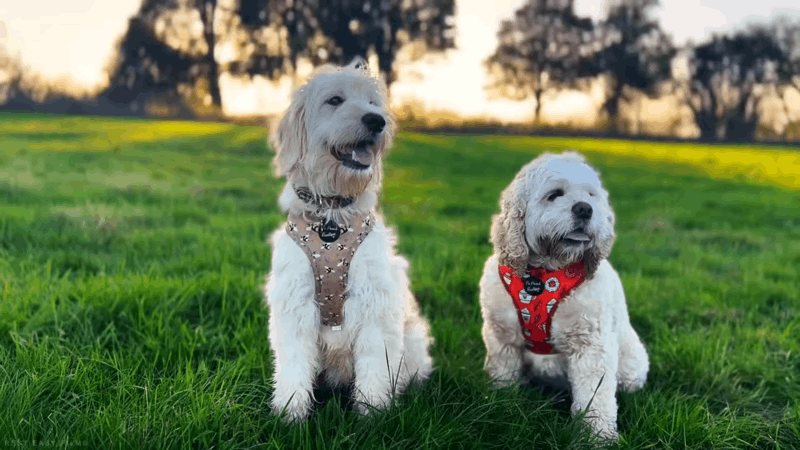No products in the cart.
Can CBD oil help dogs with laryngeal paralysis? You are aware of how challenging it may be for your dogs to breathe and maintain composure if they suffer from this illness. Laryngeal paralysis affects the muscles controlling the larynx, impacting your dog’s quality of life. Many traditional treatments exist, CBD is becoming a suitable choice of many pet owners for its potential benefits.
How CBD oil’s anti-inflammatory and calming properties might provide relief for dogs with laryngeal paralysis will be explored in this blog. Find out the significant ways that CBD oil can help you manage your dog’s symptoms and enhance their overall health.
Understanding Laryngeal Paralysis in Dogs

Dogs with laryngeal paralysis have weakening or failing laryngeal muscles, which can cause breathing problems, changes in vocalization, and even choking dangers. Large-breed, elderly dogs are the most likely to experience it. It can greatly affect a dog’s quality of life and require medical intervention for symptom management and increased health.
What is Laryngeal Paralysis in Dogs?
Dogs with laryngeal paralysis have a problem where their larynx remains partially or completely closed due to malfunctioning nerves and muscles. Normal breathing can be disrupted by this and may cause many symptoms like respiratory distress, changes in the dog’s bark, and an increased risk of choking or aspiration.
Symptoms of Laryngeal Paralysis in Dogs
Understanding the signs of laryngeal paralysis in dogs is crucial to get early intervention and therapy. Common symptoms include:
- Noisy breathing: Stridor or a high-pitched wheezing sound during inhalation due to partial airway obstruction.
- Change in bark: Hoarseness, weakening, or loss of voice as the vocal cords fail to function properly.
- Coughing or gagging: Frequently observed, especially when eating or drinking, due to difficulty swallowing and risk of aspiration.
- Exercise intolerance: Dogs may tire quickly or show reluctance to engage in physical activity due to compromised breathing.
- Increased panting: Excessive panting even at rest, as the dog attempts to increase airflow to compensate for reduced airway function.
- Labored breathing: Visible effort in breathing, often with exaggerated chest and abdominal movements.
- Bluish gums or tongue (Cyanosis): Indicative of low oxygen levels in the blood, a serious sign requiring immediate veterinary attention.
- Episodes of collapse or fainting: Can occur during periods of exertion or stress, caused by severe lack of oxygen.
To seek timely veterinary care and improve the dog’s quality of life, considering these symptoms carefully is so necessary.
What Causes Laryngeal Paralysis in Dogs?
Laryngeal paralysis in dogs can be avoided and treated easily if pet owners are aware of the causes, including:
- Congenital defects: Some dogs are born with structural abnormalities of the larynx, leading to early onset of the condition.
- Trauma or injury: Damage to the nerves controlling the larynx, often from surgery or physical injury to the neck or throat area.
- Degenerative nerve and muscle diseases: Progressive conditions like Geriatric Onset Laryngeal Paralysis Polyneuropathy (GOLPP) that affect older dogs.
- Hypothyroidism: Low thyroid hormone levels can lead to general neuromuscular weakness, including the muscles controlling the larynx.
- Aging-related degeneration: Natural wear and tear on the nerves and muscles with age, commonly affecting large-breed dogs like Labrador Retrievers and Golden Retrievers.
- Idiopathic (unknown) causes: In many cases, the exact cause cannot be determined, but it often appears in middle-aged to older dogs without a clear underlying condition.
Effective treatment and outcomes for affected pets can be guided by identifying the cause of laryngeal paralysis in dogs.
Is Laryngeal Paralysis Fatal in Dogs?

If laryngeal paralysis is not treated, it can be fatal in dogs, especially in severe cases where the airway becomes significantly obstructed. This condition can lead to respiratory distress, decreased oxygen levels, and in extreme situations, life-threatening respiratory failure.
However, with proper diagnosis and timely veterinary intervention, including medical management and surgical options, many dogs can live a comfortable and relatively normal life. To prevent fatal complications associated with laryngeal paralysis, early recognition of symptoms and prompt treatment are important keys.
How to Treat Laryngeal Paralysis in Dogs?

Laryngeal paralysis in dogs is often treated with a combination of medication and, in more severe cases, surgery. The dog’s breathing and overall quality of life can be improved is the main goal. While lifestyle modifications and medication are part of medical care, surgical methods such as laryngeal tie-back procedures can offer better long-term relief.
Medical Management of Laryngeal Paralysis in Dogs
Improving the pet’s quality of life while reducing symptoms is crucial to get an effective medical management of laryngeal paralysis in dogs. Key aspects of medical management include:
- Weight management: Keeping the dog at a healthy weight to reduce respiratory effort.
- Anti-inflammatory medications: Reducing swelling and inflammation in the laryngeal area.
- Sedatives: Alleviating anxiety and reducing excessive panting.
- Environmental modifications: Avoiding hot and humid environments, stress, and over-exertion.
- Oxygen therapy: Providing supplemental oxygen in severe cases to improve breathing.
A dog’s comfort and ability to breathe more easily will be improved by medical management while addressing these factors.
Gabapentin for Laryngeal Paralysis in Dogs
In certain cases, gabapentin is used to treat common diseases in dogs, including laryngeal paralysis by lowering anxiety and managing chronic pain, both of which can exacerbate respiratory issues. For dogs suffering from nerve pain or breathing problems brought on by stress, it can be quite beneficial. However, gabapentin is usually part of a larger treatment plan and not a standalone solution for laryngeal paralysis.
Cost of Laryngeal Paralysis Surgery in Dogs
Depending on the veterinary clinic, the patient’s location, and the case’s complexity, the cost of laryngeal paralysis surgery in dogs, such as the laryngeal tie-back treatment, can vary significantly. On average, the surgery can range from $2,000 to $4,500. This estimate often includes pre-surgical diagnostics, anesthesia, the surgical procedure itself, and post-operative care. If there are complications or the need for extended hospitalization, additional costs may arise.
Can CBD Oil Help Dogs with Laryngeal Paralysis?

Dogs with laryngeal paralysis may benefit from CBD oil by experiencing some alleviation from symptoms like anxiety and inflammation, which can worsen breathing issues. CBD is not considered to be used for laryngeal paralysis in dogs, however, its anti-inflammatory properties can reduce swelling in the laryngeal area, besides the breath and overall comfort can be improved and the anxiety can be managed by its calming effect.
To ensure CBD treatment is safe and appropriate for the dog’s specific condition, getting advice from a veterinarian is so essential. To explore a range of options tailored for your pet’s needs with high-quality CBD products, Pet CBD Club will be an ideal choice.
Conclusion
Can CBD oil help dogs with laryngeal paralysis? Evidence suggests it can alleviate inflammation and anxiety, improving your dog’s quality of life. While not a cure, CBD oil’s natural properties offer promising relief. Before starting any new treatment, consulting your veterinarian is recommended.
Hello, I am Hazel Bennett, an experienced copywriter specializing in the fascinating topic of CBD for dogs. With a passion for pet wellness and extensive knowledge of CBD’s potential benefits, I am here to provide you with informative and engaging content.



